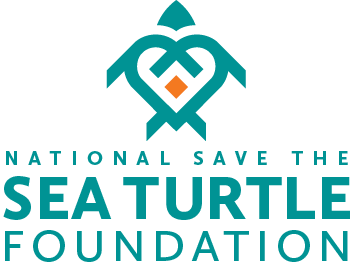How an undergraduate scholarship helped a marine biology alum start her research
Written by Catherine Guinovart
December 16, 2021
December 16, 2021
Undergraduate research fellowships at FIU are helping researchers uncover more information about the Sargassum that frequently fouls our beaches.
Marine biology alumna Samantha Olszack, credits the National Save the Sea Turtle Foundation for making her research — delayed by COVID-19 — possible.
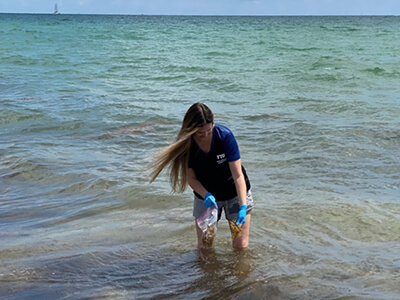
Olszack collects samples near the shore. Photo courtesy Samantha Olszack
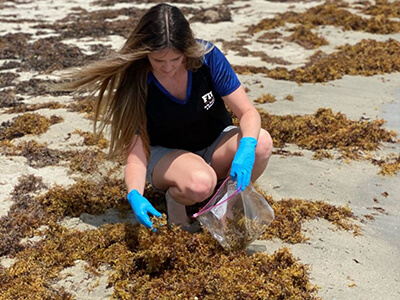
Olszack collects samples on the shore. Photo courtesy Samantha Olszack
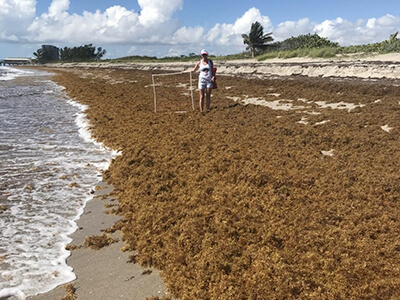
A view of the Sargassum landing at Dania Beach. Photo courtesy Samantha Olszack
Olszak, who graduated from FIU in Fall 2020 with a bachelor’s degree in marine biology, finished her research on the floating macroalgae that washes ashore on Florida beaches in 2021 as a volunteer intern at FIU while simultaneously beginning graduate school at Nova Southeastern University.
“I’m so grateful to the National Save the Sea Turtle Foundation for their support of this project. I strongly felt this work needed to be followed through despite the challenges faced with COVID-19 and even after graduation,” Olszack said. “This project deals with real-world issues affecting the environment, wildlife, and sea turtles specifically.”
Floating macroalgae serve as a refuge sheltering juvenile sea turtles and hatchlings from predators as they start their lives in the open ocean. On shore, Sargassum can pile up as much as 6 feet high, creating a barrier for female sea turtles searching for suitable nesting areas and hatchlings exiting their nests between May and October.
Healthy sea turtle populations are critical to the protection of the world’s oceans. Turtles maintain seagrass and coral reef ecosystems, provide habitat for marine life, balance marine food webs and help cycle nutrients from water to land.
Olszack’s undergraduate research focused on another important threat posed by Sargassum: when it decomposes, Sargassum may leach toxic chemicals such as arsenic into the sand. This poses a threat to not only human health but to sea turtle eggs and hatchlings, too.
Sargassum accumulations had a big impact in 2011 because of an extreme anomaly of the North Atlantic Oscillation in 2010 that created the perfect conditions for Sargassum to grow in an area called “The Great Belt” between South America and Africa. Sargassum that is dislodged from this area usually washes ashore in the Caribbean and in South Florida.
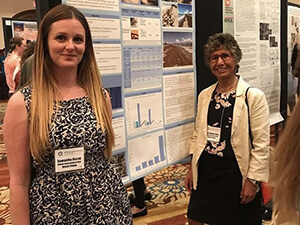
Samantha Olszack presents her research
alongside her advisor Ligia Collado Vides.
Photo courtesy Samantha Olszack
alongside her advisor Ligia Collado Vides.
Photo courtesy Samantha Olszack
“This is the largest bloom of macroalgae in the world and it’s here to stay,” said FIU Biological Sciences Department Associate Chair Ligia Collado-Vides, who was Olszak’s adviser. “Samantha’s work is critical because one of the big questions is ‘Can we use Sargassum as compost?’ But, we still have a lot to learn about its decomposition.”
The National Save the Sea Turtle Foundation has also funded other FIU research projects related to sea turtle conservation. In the last year, they have also funded student internships.
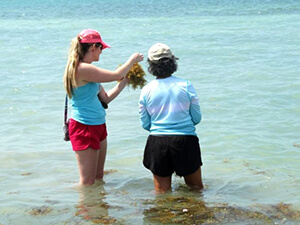
Olszack collects samples near the shore with
her advisor, Ligia Collado Vides.
Photo courtesy: Samantha Olszack
her advisor, Ligia Collado Vides.
Photo courtesy: Samantha Olszack
“FIU students are truly making a difference in the field of sea turtle research and conservation,” said National Save the Sea Turtle Foundation Research Coordinator Larry Wood. “We are excited to support them so that they can gain lifelong experience by using their knowledge and skills to study these gentle creatures.”
Students and faculty at the Coastlines and Oceans Division of FIU’s Institute of Environment are leading efforts to better understand the role sea turtles play in ocean ecosystems.
In part because of the research conducted by the Institute of Environment, FIU was ranked the No. 3 public university in the U.S. and No. 11 in the world for SDG 14, Life Below Water, which measures universities’ research on life below water and their education on and support for aquatic ecosystems. Freshwater, coastal and ocean initiatives are led by the FIU Institute of Environment.
Helping Sea Turtles Survive for 39 Years
A NON-PROFIT ORGANIZATION
State of Florida Registration Number CH-2841 | Internal Revenue Code 501 (c) (3)
Web Design & Development by Web Expressions, LLC
